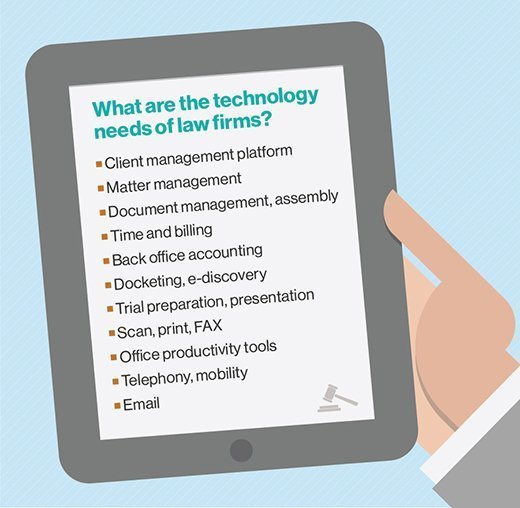
Maksim Kabakou - stock.adobe.com
AI in the legal industry focuses on augmenting research
From billable time invoice generation to patent attribute data mining, the implementation of AI in law firms has aided in reducing low-value, time-consuming paralegal work.
The legal profession is largely the domain of humans -- machines don't normally enter into arguments made in front of judges or juries or between corporate counsels. However, despite the particularly human nature of the legal profession and paperwork, AI in the legal industry is steadily enhancing legal processes and activities.
AI helping to manage law practices
Law practices are heavily dominated by document-based processes and human-centric workflows. Those who have been tracking applications of AI and machine learning know that industries with these factors are ripe for disruption with intelligent technologies. In fact, law practices can quickly benefit from the use of AI-enabled systems to help improve operations, enhance document handling and speed up legal processes.
Legal practice management software systems are overwhelmingly and rapidly adding AI capabilities to track billable hours per client to automatically generate invoices at the end of each month or time period. By using machine learning, these systems can spot patterns in work hours, suggest efficiencies in work output and identify the potential for additional work. They can also spot anomalies in legal time tracking and billing to avoid invoicing mistakes.
Additionally, machine learning AI applications in the legal industry are particularly helpful at document classification and text summarization. These capabilities are finding their way into software that is able to digest and examine enormous quantities of legal documents, ranging from contracts to court notices, and automatically classifying and analyzing these documents. Rather than requiring a junior legal assistant to manually read each document and generate a standard response, automated machine learning-enabled process systems can learn document-specific courses of action and automatically execute activities or generate new documents as needed by the legal process. These AI-powered systems can also be used to organize and rank the relevance of documents for disclosure purposes.
Law firms are also making use of voice assistants to augment their legal processes. Virtual assistants -- such as Amazon's Alexa, Microsoft's Cortana and Apple's Siri -- give employees a conversational interface to search through documents and interact with clients. These systems provide automated response and interaction between the law firm and its various parties in order to speed up legal processes, reduce costs and increase customer satisfaction.

Enhancing legal research and analysis
AI-enabled systems are helping with legal review, research and contract analysis. AI software is being used as a second set of eyes that reads important contracts and checks for any missing, incorrect or improper clauses. Contract intelligence systems can extract nearly 150 attributes from 12,000 commercial credit agreements and contracts in only a few seconds and analyze them for consistency and correctness. Furthermore, intelligent document management systems enabled with machine learning can rapidly confirm facts and find background information, which can accelerate arbitration and litigation proceedings.
AI-enabled systems are also helping with legal research by helping lawyers find relevant material pertaining to their case by combing through related sites and documents. This application of AI is particularly useful, as law firms that use AI will enable lawyers to analyze larger amounts of data without requiring significant additional legal staff.
Law firms are also making increasing use of AI's predictive power. Through predictive analytics, AI systems can examine years' worth of legal data to help predict the likelihood of winning relevant cases. These systems can even use court docket databases and other sources of information to give lawyers insights into how a judge may rule in a particular case. Lawyers can use AI systems to learn from past case law, win/loss rates and a judge's history to identify trends and patterns in rulings.
A particular subset of law -- intellectual property -- can be particularly assisted by AI. Humans are not easily able to search large quantities of patent filings, existing claims, pending or granted trademarks, or copyright filings to know if a particular patent, trademark or copyright infringes on an existing intellectual property claim. Traditional keyword-based searches to sift through all that information are proving limited in scope. AI systems, however, are potently able to crunch through huge amounts of data and find similarities among different intellectual property filings with a rate and accuracy no human could match. AI tools can also guide lawyers in analyzing existing large intellectual property portfolios and draw greater insights from the content.
Enabling self-service legal help
While dealing with the law and legal contracts might be an absolute necessity, working with lawyers might not always be needed. Increasingly, companies are bringing to market AI-enabled, self-service law tools that can provide legal help and support with an online interface. Legal companies, such as Rocket Lawyer, interact with customers online to generate legal documents or help individuals and businesses produce legal documents without having to consult a lawyer. Other systems can interactively guide individuals through filing legal complaints, handling routine legal matters or dealing with particular legal situations, such as tenant evictions or airline reimbursement claims.
New entrants in the legal aid market are providing self-help services using chatbots and AI systems that interact through conversational interfaces to provide users with answers to legal questions. In situations where clients might be financially unable to afford competent legal help, this AI can provide significant benefit. These conversational systems are also helping beleaguered public defender offices that operate with extremely limited resources and face the brunt of legal representation quality complaints. AI-enabled legal defenders, such as those being developed by the open source Tubman Project, are helping to offload cases and change the dynamic of the public defender system.
While the practice of law might be a quintessentially human endeavor, the use of AI in the legal industry is making even this profession one that can benefit from intelligent machine-based systems.






